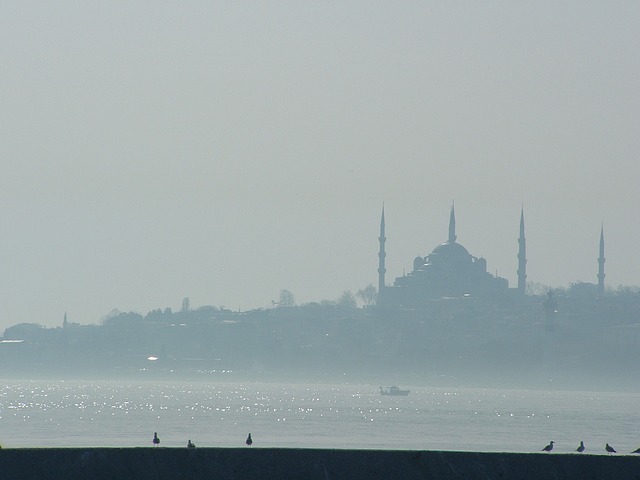-
16 February 2017
Category : Sin categorizar
“They are inspired by the enthusiasm of contributing to the improvement of justice in a country like Turkey”
Vanessa Untiedt, FIIAPP's special envoy in Turkey, tells us how a project to strengthen free legal aid in Turkey is being implemented in spite of the difficult context of the country.
 Views of Hagia Sophia in Istanbul, Turkey.
Views of Hagia Sophia in Istanbul, Turkey.The project to strengthen free legal aid in Turkey, managed by FIIAPP, started on 16th June 2016. After barely a month, there was an attempted coup d’état, which we refer to colloquially as the “15th of July”. Whenever we make any official mention of the failed coup d’état, we are talking about: before 15 July or after 15 July, but without using the words “coup d’état”.
The situation in Turkey after that date is complicated. There have been mass arrests and suspensions, which have affected all areas of society, including judges, prosecutors, lawyers… However, the progress of the project has not been directly affected. As a result, we continue working, and many Spanish experts are still coming to Ankara to work on the objectives we set over a year ago. Five of these experts were in Ankara the night of 15th July and, even so, they have come back on several occasions. In my opinion, they are inspired by the enthusiasm of the sense that they are contributing to improving justice administration in a country like Turkey, where the refugee crisis has accentuated the need for strengthening the system for accessing justice. Without the work of the experts, this project could not be carried out, nor would it be possible without the help of the project leader, Amparo Mahiques, and the technical assistant, Esther Utrilla. The ongoing support of the Spanish embassy in Ankara is also noteworthy, especially that of Ambassador Rafael Mendivil.
The free legal aid and access to justice project is complicated:
- On one hand, we have two beneficiaries: the Turkish Bar Association and the Ministry of Justice. Two beneficiaries whose relations, before the project started, were less than fluid when not non-existent. Nevertheless, over these months, we have managed to bring them together each time there is an activity, and they have travelled to three countries together (in these seven months of the project, they have completed 12 activities and made three study visits, to Lithuania, Spain and France).
- On the other hand, although Spain is leading the project, we are working in a consortium with Lithuania and France. This circumstance is often enriching, but other times it is quite complicated to combine the different visions on implementation of the project.
Although the Twinning projects of the countries applying to join the European Union are aimed at facilitating the country’s entrance into the Union, in this project we try not to look too far ahead but to take things one step at a time.
Right now we are working on a rather interesting component that involves raising the visibility of the project and working on ways to make justice more accessible to citizens. Firstly, we establish the groups that, due to their vulnerability, should be targeted for greater attention: refugees, women who are victims of gender-based violence, people living in rural areas, minors, disabled persons…Then we establish the channels through which to show them what their rights are when accessing justice, as well as the possibility of having a lawyer defend them in court.
We are ambitious. In each component, we try to expand the objectives negotiated initially. We aren’t always successful, but if we can at least achieve one or more of those set at the beginning, we consider that a reason for satisfaction.
In the seven months of the project, we have achieved the following goals, among others:
- There has been a discussion of the convenience (and need) for there to be a single law on free legal aid. You see, today’s regulations on free legal aid are dispersed in various legal texts. Publication of this law will be a great help both to lawyers and to judges and prosecutors.
- We have managed to conduct a satisfaction survey of the users of the free legal aid system. Although this is an apparently simple task, in the end it turned out to be quite complicated. Firstly, due to the reluctance shown by the beneficiaries; secondly, because once these were overcome, it was necessary to reach agreement with the two beneficiaries on how to go about it; and lastly, because the costs of conducting the survey had to be covered by the beneficiary country, as stipulated in the project contract.
- A catalogue was designed so that law graduates could learn about the steps to be followed to access the lists of legal-aid lawyers.
- The possibility of eliminating the taxes legal-aid lawyers pay on the fees they receive was assessed.
- A strategic communication plan was designed which contemplates the existence of a bus that would circulate between the different cities providing information about the right to free legal aid and the channels and requirements for exercising this right.
- Work has begun on building a website where citizens can find out in a simple and accessible manner about the steps to take when they need a lawyer and lack the economic resources to hire one.
The views and opinions expressed in this blog are the sole responsibility of the person who write them.




